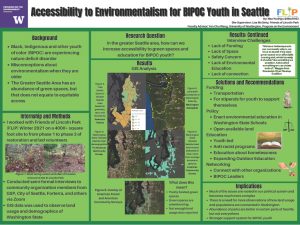Accessibility to Environmentalism for BIPOC Youth in Seattle
Green spaces play an important role in upholding environmentalism, providing spaces for socialization and health benefits. But there is only a specific group of people that have access to these spaces. Green spaces are built in wealthier, predominately white, neighborhoods and communities. This leaves out black, indigenous, and other groups of color (BIPOC) from using green spaces, as they feel as they are not welcomed. This is problematic because green spaces and the idea of environmentalism becomes dominated by white voices, but historical BIPOC have played a big role in environmentalism. They are also the ones who suffer more of the consequences of environmental impacts. The aim of this study was to explore BIPOC youth interactions with green spaces looks for strategies to strengthen those connections and get them engaged. To explore the equity issue of accessibility to parks for BIPOC youth, semi-formal interviews with Greater Seattle Area organizations like Friends of Lincoln Park were conducted and GIS mapping laid out the challenges which include funding, safety issues, and lack of environmental education. Some of the recommendations to address the issues were to properly fund organizations for better programming, organizational support for BIPOC youth in parks, policy for environmental education in Washington schools, and anti-racist programs for older folks. It is important to give BIPOC youth the confidence, voice, and leadership positions, as they were prevented from being part of the conversation as a result from systematic oppression within all systems and they are our future.
